For some teams, recruitment runs on memory.
That quick call last week. A note scribbled mid-interview. The resume someone swore they sent.
Details scatter fast, and in the middle of it all, good candidates get away.
Recruitment database software is built to fix that. It anchors the search—names, conversations, timelines—everything sits in one place, easy to find and easier to act on.
Here are 10 solid options worth looking at. 👀
- 10 Recruitment Database Software at a Glance
- What Should You Look for In Recruitment Database Software?
- The Best Recruitment Database Software
- 1. ClickUp (Best for end-to-end hiring process tracking and collaboration)
- 2. Workable (Best for teams needing compliance and reporting)
- 3. Greenhouse (Best for scaling teams with structured interviews)
- 4. Zoho Recruit (Best for budget-conscious teams needing customization)
- 5. Recruit CRM (Best for agencies focused on client relationships)
- 6. Manatal (Best for AI-powered candidate matching)
- 7. Fetcher (Best for proactive recruitment automation)
- 8. SeekOut (Best for uncovering hidden talent in niche fields)
- 9. JobAdder (Best for recruitment workflow efficiency)
- 10. Gem (Best for talent relationship nurturing)
- Frequently Asked Questions
10 Recruitment Database Software at a Glance
| Tool Name | Use Case | Best For | Pricing* |
| ClickUp | Builds a unified hiring system with customizable workflows, tags, and dashboards | Managing multiple roles and recruiters in one workspace | Forever free plan; Paid plans available |
| Workable | Guides recruiters through structured pipelines with audit-ready compliance tools | Streamlining hiring while staying legally aligned | Paid plans start from $360/month |
| Greenhouse | Equips teams with evaluation frameworks and diversity analytics | Reducing bias and improving candidate assessment consistency | Custom pricing |
| Zoho Recruit | Adapts easily through automation, configurable fields, and multi-channel sourcing | Customizing processes without heavy overhead | Free plan available; Paid plans start from $30/user/month |
| Recruit CRM | Balances talent tracking with branded client submissions and white-labeled portals | Staffing agencies focused on client experience | Paid plans start from $100/user/month |
| Manatal | Matches roles to candidates using AI-enriched profiles and intelligent recommendations | Tech-forward hiring across diverse locations | Paid plans start from $19/user/month |
| Fetcher | Automates outreach and sourcing using email campaigns and engagement insights | Proactive recruiters scaling outbound efforts | Paid plans start from $499/month |
| SeekOut | Surfaces hard-to-find candidates through Boolean logic, research data, and enriched profiles | Tapping into niche or underrepresented talent pools | Custom pricing |
| JobAdder | Simplifies daily tasks with templates, bulk actions, and seamless device syncing | Recruiters optimizing daily workflows and mobility | Custom pricing |
| Gem | Keeps passive candidates engaged with long-term nurture campaigns and analytics | Relationship-driven hiring and talent pipeline growth | Paid plans start from $300/month |
How we review software at ClickUp
Our editorial team follows a transparent, research-backed, and vendor-neutral process, so you can trust that our recommendations are based on real product value.
Here’s a detailed rundown of how we review software at ClickUp.
What Should You Look for In Recruitment Database Software?
The right recruitment database software organizes candidate data, automates tedious tasks, and fits your team’s recruiting tech stack. To pick a winner, zero in on these must-haves:
- User-friendly interface: Streamlines HR planning with an intuitive design, saving your team from steep learning curves
- Advanced search capabilities: Pinpoints ideal candidates quickly using precise filters, keywords, and skill-based queries
- AI-driven matching: Enhances precision by aligning candidate profiles with job requirements through intelligent algorithms
- Seamless integrations: Syncs with job boards, LinkedIn, and email platforms to simplify sourcing and communication
- Automated workflows: Speeds up hiring by handling repetitive tasks like status updates and interview scheduling
- Robust reporting tools: Provides detailed metrics to refine strategies and track hiring performance effectively
- Mobile accessibility: Enables on-the-go management of candidates and tasks from any device
- Scalable architecture: Adapts to growing hiring demands without compromising speed or functionality
The Best Recruitment Database Software
Great hiring needs more than a place to store resumes. You need recruitment tools that help you keep everything organized, track progress, and make quick decisions.
Here are the best options to help you do exactly that. 👇
1. ClickUp (Best for end-to-end hiring process tracking and collaboration)
You’re frantically toggling between 17 browser tabs, trying to piece together which UI designer candidates made it to the final round. Was it the one with the impressive portfolio but spotty video connection, or the one your lead developer raved about in that email thread you can’t find?
Tomorrow’s executive meeting looms, and you’ve got nothing but fragmented data. 📊
Enter ClickUp: your hiring command center.
The ClickUp HR Solution combines project management, knowledge management, and chat—all powered by AI that helps you work faster and smarter.
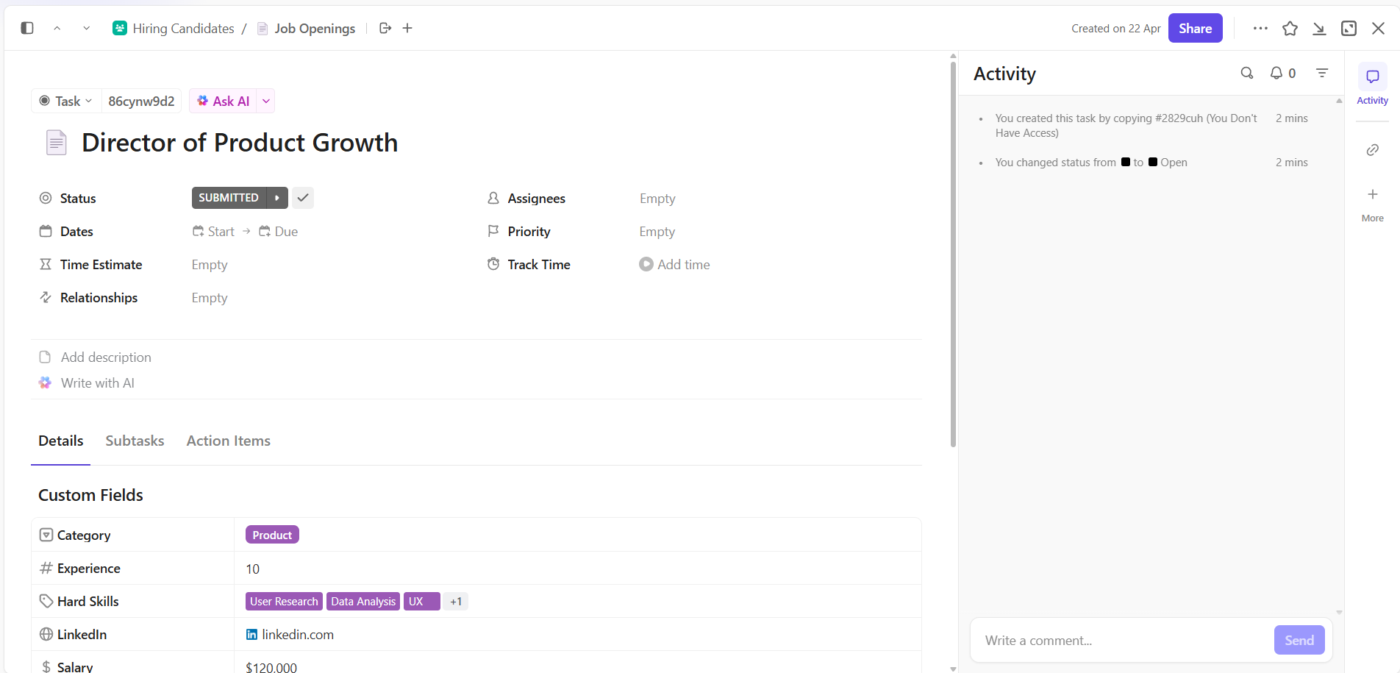
Start by building your hiring workflow inside ClickUp Tasks. Think of each role as a task, like ‘Customer Success Manager – East Coast,’ and create subtasks for each hiring step.
Assign recruiters, set due dates, attach resumes or portfolios, and drop comments for context.
Then layer in ClickUp Custom Fields to turn that workflow into a true database. Add fields like ‘Visa sponsorship needed,’ ‘Time zone overlap,’ or ‘Preferred notice period. ’ When you’re filling five roles at once and need to pull up all candidates open to contract work and available within two weeks, you won’t have to dig.
To make sense of everything at a glance, switch between ClickUp Views. 👇🏼
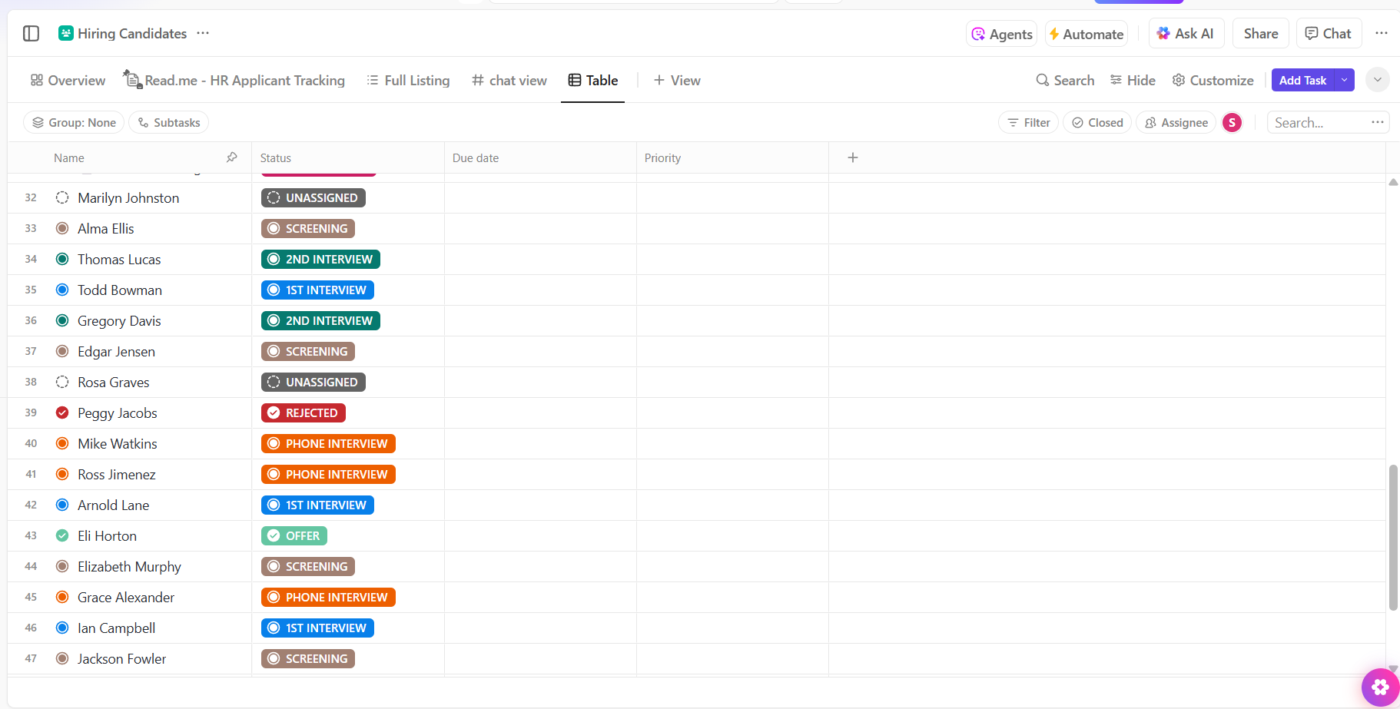
ClickUp’s Board View is perfect when you want to drag candidates across stages: sourced, interviewed, and shortlisted. Meanwhile, ClickUp Table View helps when you’re comparing things like expected comp, recruiter notes, or hiring stage across roles.
When it’s time to dig deeper, ClickUp Docs keeps all the extra context right where you need it. Create a Doc to collect written assessments, interview notes, or feedback summaries, then link it directly inside a Task.
Let’s say the hiring manager drops detailed feedback after the panel round. You can centralize that input and tag recruiters or stakeholders to loop them in, without toggling between tools.
Then there’s ClickUp Automation and AI Autopilot Agents, which quietly handle what you’d rather not.
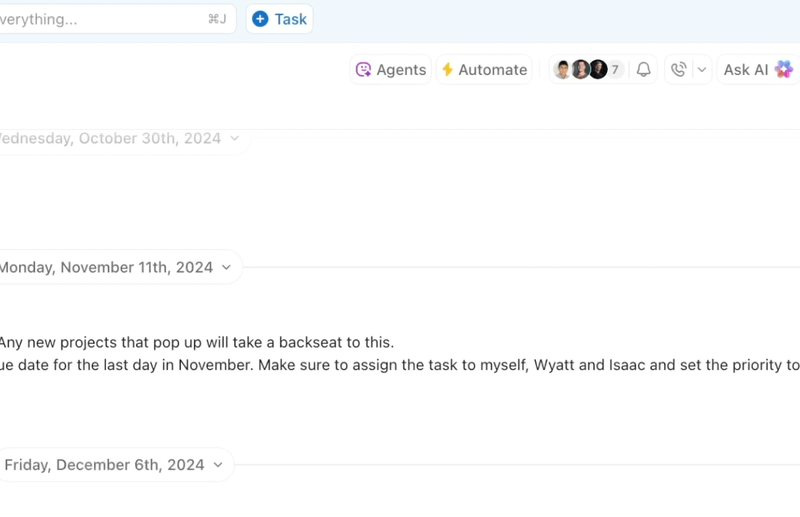
Set up rules like: when a task moves to ‘Final Interview’, notify the recruiter and add a checklist for next steps. Or when a candidate is marked ‘Rejected’, auto-assign a follow-up email task and move the role back to ‘Open’. It’s the stuff that usually slips; now, it doesn’t.
And if you’d rather not build from scratch, use the ClickUp Recruitment Action Plan Template. It’s already set up with hiring stages, task templates, and views tailored for recruitment.
ClickUp best features
- Control handoffs across hiring stages: Set up ClickUp Task Dependencies so no one jumps the line, like blocking offer approvals until all interview feedback is submitted
- Tag and group candidates fast: Use ClickUp Tags to organize profiles by skill, role type, or urgency. Tags like ‘frontend dev’ or ‘referral’ help surface the right candidates quicker
- Sync your CRM for candidate context: Connect your CRM to the platform via ClickUp Integrations to pull in messages, past interactions, and source details
- Filter your pipeline by what matters: Apply filters to narrow your database view. Show only ‘open roles in New York’ or ‘candidates in final round’, no need to scroll endlessly
- Track hiring metrics at a glance: Create ClickUp Dashboards to monitor candidate progress, recruiter bandwidth, and role-specific timelines
- Summarize candidate profiles: Let ClickUp Brain scan long application forms or interview transcripts and pull out key highlights, like experience, skills, and red flags
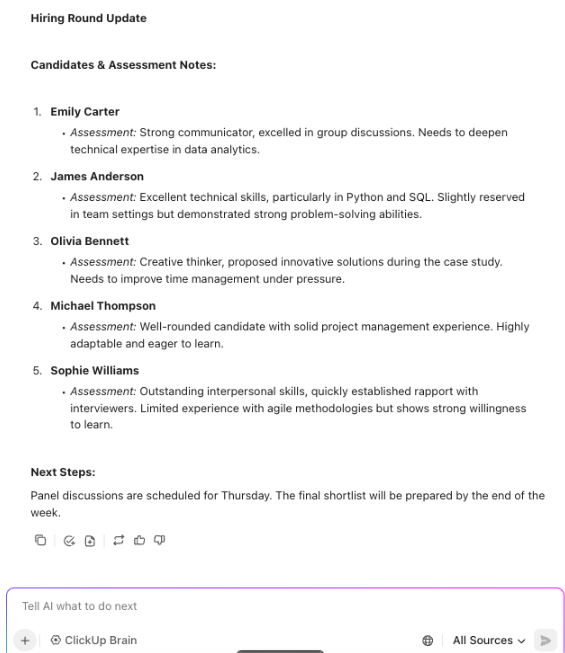
ClickUp limitations
- The extensive feature set may take some time get used to
ClickUp pricing
ClickUp ratings and reviews
- G2: 4.7/5 (10,180+ reviews)
- Capterra: 4.6/5 (4,440+ reviews)
What are real-life users saying about ClickUp?
Here’s what a G2 reviewer wrote about ClickUp:
2. Workable (Best for teams needing compliance and reporting)
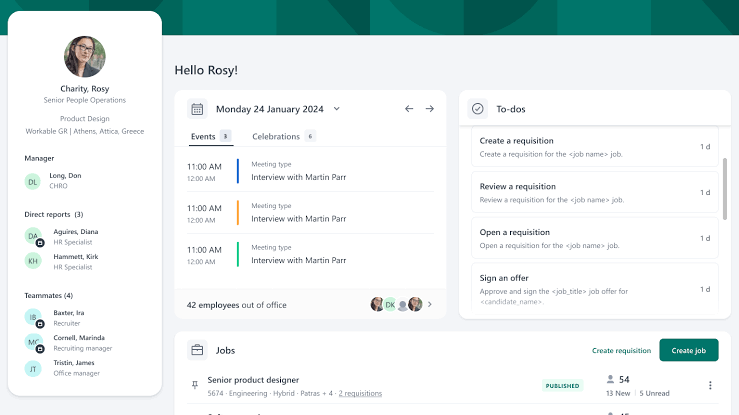
Workable feels like having a recruitment legal expert and data analyst on your team 24/7.
It ushers you through hiring workflows that are locked down for legal precision, gathering every candidate detail with care as you progress from job posting to final hire. The flow shifts seamlessly to its reporting dashboard, a crisp interface that rolls out real-time hiring metrics and team performance data, ready for you to act on.
The system syncs with over 70 free and paid job boards to draw in talent from all corners and an employee referral portal that gets your team pitching their top picks.
Workable best features
- Create professional-looking branded career pages that match your company’s aesthetic
- Track candidates through customizable hiring pipelines that adapt to different departments’ unique recruitment workflows
- Generate comprehensive compliance documentation automatically for audit purposes, saving your legal team countless review hours
- Schedule interviews seamlessly across multiple time zones with smart calendar syncing
Workable limitations
- Users have encountered difficulties with API integrations and resume uploads
- It does not integrate with popular virtual conferencing services like Zoom, making it challenging to schedule and conduct interviews
- Workable lacks robust recruitment CRM functionality and customization options
Workable pricing
- Standard: Starting from $360/month
- Premier: Starting from $599/month (billed annually)
Workable ratings and reviews
- G2: 4.5/5 (445+ reviews)
- Capterra: 4.4/5 (490+ reviews)
What are real-life users saying about Workable?
This is what a G2 review said about Workable:
📖 Also Read: How to Improve Your Recruitment Skills
3. Greenhouse (Best for scaling teams with structured interviews)
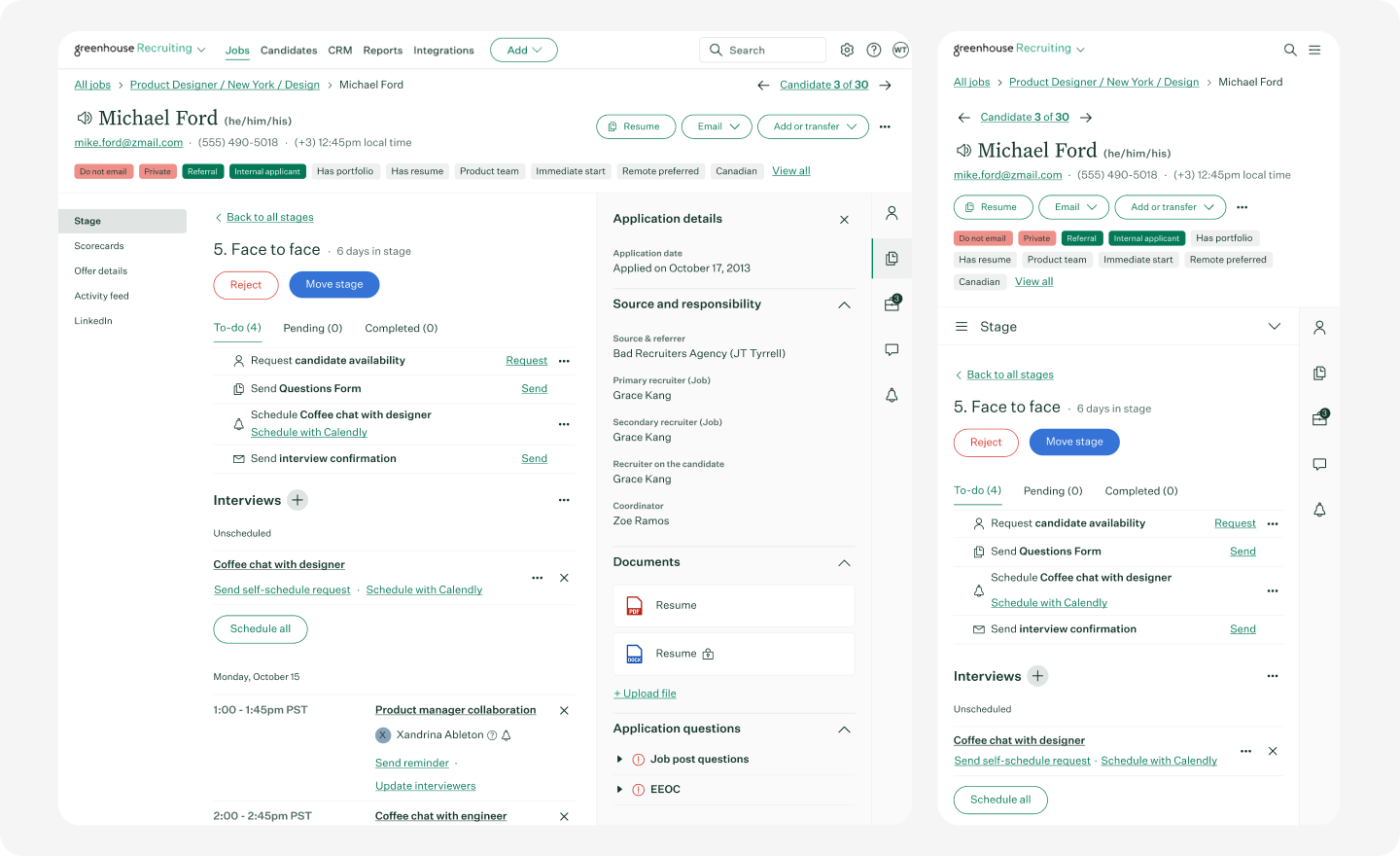
Looking to eliminate hiring bias while scaling your team? Greenhouse shines here. This recruitment database software turns interviewers into structured assessment pros with customized scorecards that focus on skills, not gut feelings. Talk about a refreshing approach!
You’ll notice how the candidate experience gets a major upgrade, too—automated communications keep applicants informed without you lifting a finger. And forget awkward handoffs between teams; the collaborative interface keeps everyone from recruiters to hiring managers on the same page.
Greenhouse best features
- Design scorecards that standardize candidate evaluations across all interviewers, reducing unconscious bias in hiring
- Implement structured interview kits that ensure every candidate faces consistent questions tailored to specific role requirements
- Generate comprehensive diversity and inclusion reports that help identify bottlenecks affecting underrepresented candidates
- Track interview team performance with metrics showing which interviewers provide the most detailed and useful feedback
Greenhouse limitations
- The self-scheduling feature lacks rules, allowing candidates to book every available slot with no buffers
- The candidate search function in Greenhouse is not flexible, allowing only for name searches rather than phone or email
Greenhouse pricing
- Custom pricing
Greenhouse ratings and reviews
- G2: 4.4/5 (3,260+ reviews)
- Capterra: 4.5/5 (730+ reviews)
What are real-life users saying about Greenhouse?
A user review says:
🔍 Did You Know? According to LinkedIn, companies with strong internal mobility programs see 2x the employee retention rate over two years. A recruitment database helps track internal skills and surfaces the right people when roles open up.
4. Zoho Recruit (Best for budget-conscious teams needing customization)
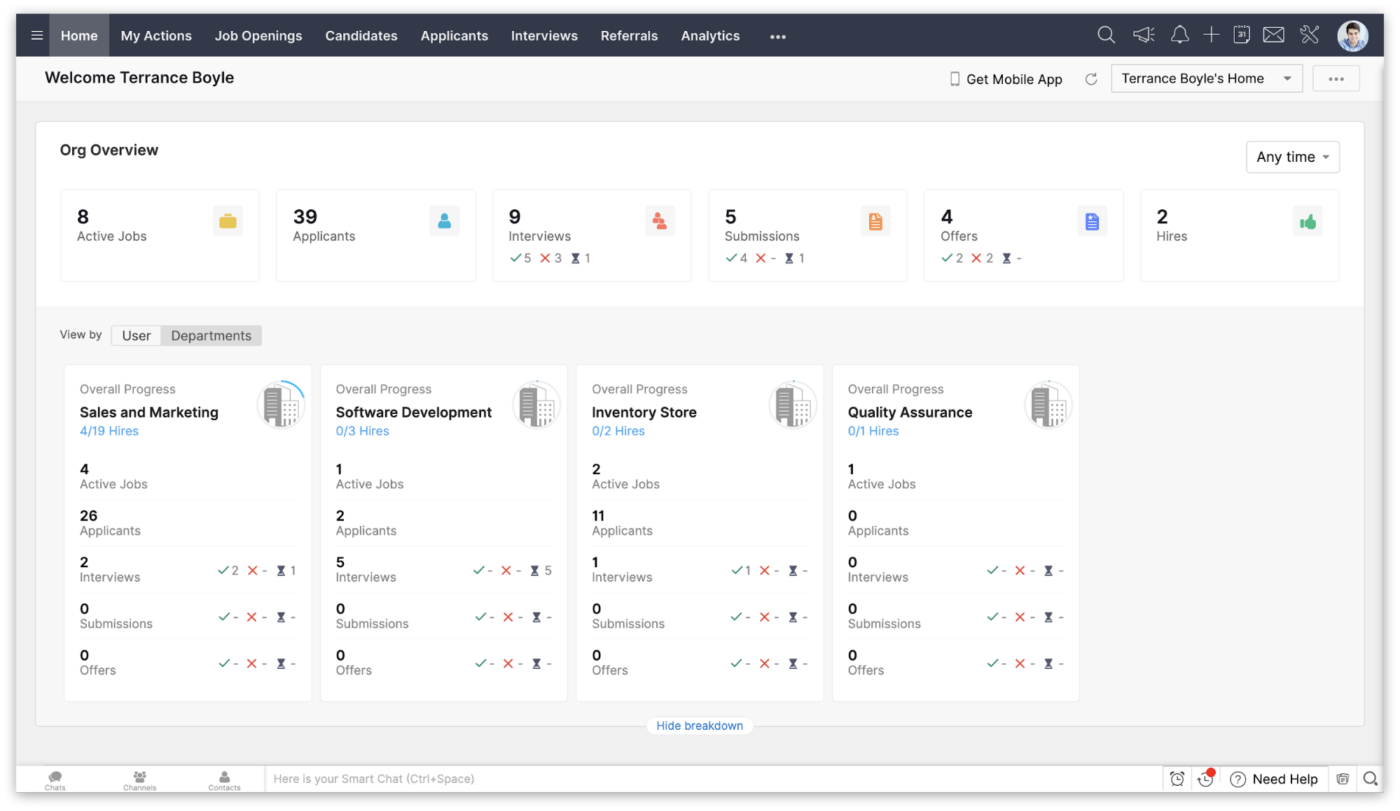
Zoho Recruit delivers impressive functionality without the enterprise price tag. Customization forms the cornerstone of this talent management software, allowing teams to adapt the system to their specific needs rather than conforming to rigid structures.
Need fields for obscure certifications or industry-specific assessments? Done. Small recruiting teams particularly appreciate how the interface eliminates unnecessary clicks and screens.
Of course, being part of the Zoho ecosystem means smooth sailing if you already use their other tools.
Zoho Recruit best features
- Set up complex automation rules that trigger personalized actions based on candidate behavior or profile changes
- Design multi-touch email campaigns that nurture passive talent pools with relevant content over extended time frames
- Access comprehensive analytics dashboards that visualize hiring metrics across different departments, locations, and recruitment channels
- Deploy the built-in GDPR compliance toolkit to manage candidate data retention policies and consent
Zoho Recruit limitations
- It limits pre-screening assessments to 20 questions
- Some users have noted difficulties with integrations and a lack of advanced automation features
- The interface appears dated compared to newer recruitment platforms
Zoho Recruit pricing
For corporate HRs
- Free
- Standard: $30/month per user
- Enterprise: $60/month per user
For staffing agencies
- Free
- Standard: $30/month per user
- Professional: $60/month per user
- Enterprise: $90/month per use
Zoho Recruit ratings and reviews
- G2: 4.4/5 (1,770+ reviews)
- Capterra: 4.5/5 (1,015+ reviews)
What are real-life users saying about Zoho Recruit?
Here’s a G2 reviewer’s take on this tool:
💡 Pro Tip: Every time you lose a strong candidate to timing or budget, tag them clearly and write a short internal note on why they were a top choice. Next time a similar role opens, you’ll already have a warm lead.
5. Recruit CRM (Best for agencies focused on client relationships)
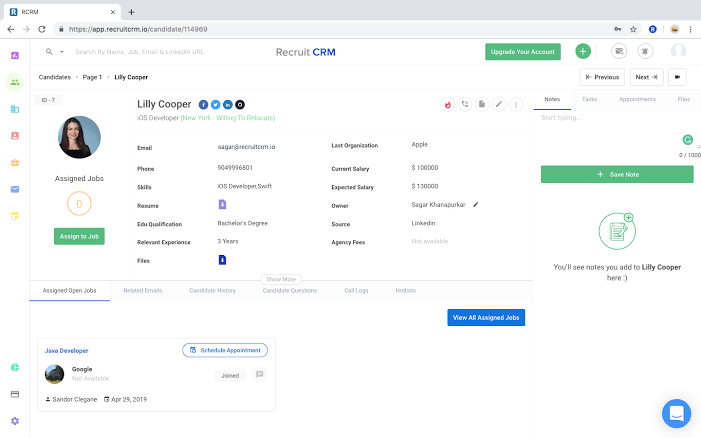
Recruit CRM centers around a dual-focused approach, giving equal weight to talent pipelines and client engagement. Email sequences keep both candidates and clients informed without manual intervention.
The intuitive drag-and-drop interface accelerates adoption, particularly for teams transitioning from spreadsheets. AI-powered candidate matching suggests optimal talent for open roles, reducing the time recruiters spend sifting through databases.
Additionally, the white-labeling options allow agencies to maintain brand consistency when sharing candidate profiles with clients.
Recruit CRM best features
- Generate branded candidate profiles and submission packets that showcase your agency’s professional standards to clients
- Manage job orders through customizable workflows that align with your agency’s unique client service approach
- Create automated email sequences that nurture both candidate and client relationships simultaneously
- Access job placement analytics that highlight which recruiters, industries, and client types drive the most revenue
Recruit CRM limitations
- Limited enterprise-level features compared to larger applicant tracking system (ATS)
- Its reporting capabilities lack some advanced customization options
- Calendar sync occasionally experiences delays with some providers
- Search functionality works best with structured rather than unstructured employee data
Recruit CRM pricing
- Pro: $100/month per user
- Business: $150/month per user
- Enterprise: Custom pricing
Recruit CRM ratings and reviews
- G2: 4.8/5 (85+ reviews)
- Capterra: 4.9/5 (435+ reviews)
What are real-life users saying about Recruit CRM?
A user review says:
6. Manatal (Best for AI-powered candidate matching)
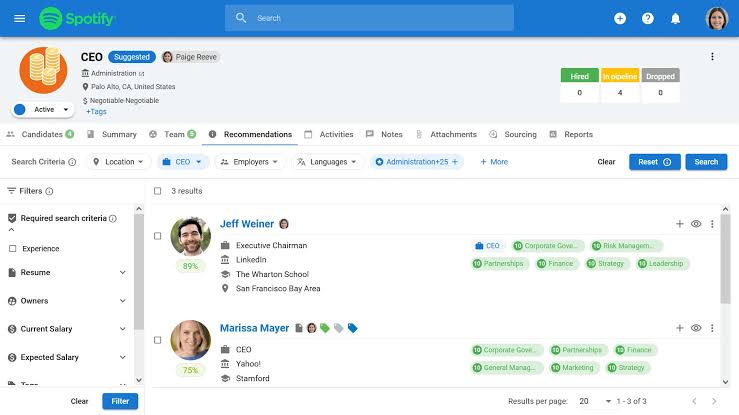
Manatal distinguishes itself through powerful AI matching capabilities that accurately connect qualified candidates to appropriate roles. The recruitment database software analyzes keywords, contextual information, skills, relationships, and even career progression patterns.
For organizations operating globally, this AI tool for recruitment provides multi-language support when working across different regions. Its built-in collaboration tools facilitate smooth handoffs between team members throughout the hiring process.
Manatal best features
- Enrich candidate profiles automatically with relevant social media information pulled from public professional profiles
- Collaborate across recruitment teams with built-in commenting, tagging, and notification systems that maintain process momentum
- Deploy different recruitment pipelines for various positions or departments with unique stages and requirements
- Create and send offer letters using customizable HR templates to track acceptance and facilitate onboarding
Manatal limitations
- Customization options for workflows and processes are limited
- Bulk actions lack some efficiency features for high-volume recruiting processes
- The search bar does not allow users to locate archived candidates without unarchiving them first, adding extra steps to the process
Manatal pricing
- Professional: $19/month per user
- Enterprise: $39/month per user
- Custom plan: Custom pricing
Manatal ratings and reviews
- G2: 4.8/5 (140+ reviews)
- Capterra: 4.6/5 (135+ reviews)
What are real-life users saying about Manatal?
A Capterra reviewer says:
💡 Pro Tip: Break feedback into repeatable categories like ‘technical fit,’ ‘culture alignment,’ and ‘communication style.’ Over time, you’ll spot patterns in team preferences and close hiring loops faster.
7. Fetcher (Best for proactive recruitment automation)
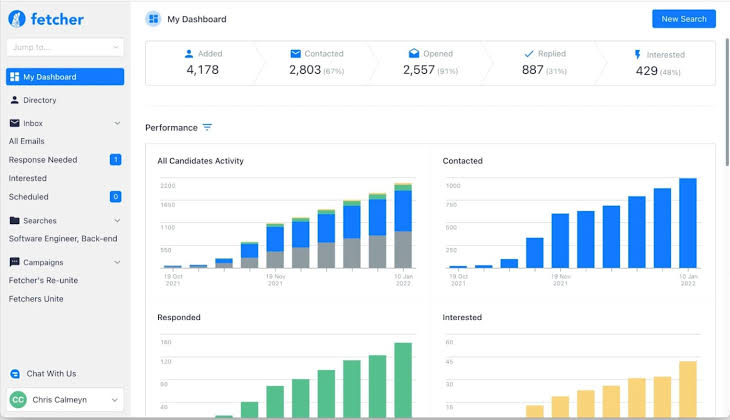
Fetcher AI helps you find candidates through smart search that adapts to what recruiters like. You can send personalized email sequences to many people at once that sound natural.
The Chrome extension allows you to add promising candidates from LinkedIn or other sites directly to your Fetcher pipeline with a single click.
Plus, teams can work together without contacting the same people twice. The dashboard shows you how candidates actually engage with your outreach, not just basic numbers. This works well for technical and specialized positions where qualified people typically don’t use standard job boards.
Fetcher best features
- Track engagement metrics, including open rates, response rates, and conversion-to-interview percentages across all campaigns
- Refine search parameters based on performance data that shows which candidate profiles yield the highest engagement
- Access your recruiting pipeline from anywhere with a mobile app for on-the-go candidate management
- Schedule interviews directly through two-way calendar integration that shows real-time availability to candidates
Fetcher limitations
- Primarily focused on outbound recruiting, with fewer inbound application management features
- Some users have reported that AI in recruitment may source candidates who do not fully meet specific skill or experience requirements
- Its integration ecosystem is still developing compared to established ATS platforms
Fetcher pricing
- Growth: $499/month
- Amplify: $849/month
- Enterprise: Custom pricing
Fetcher ratings and reviews
- G2: 4.6/5 (25+ reviews)
- Capterra: 4.6/5 (30+ reviews)
What are real-life users saying about Fetcher?
Here’s a G2 review left for this recruitment database software:
8. SeekOut (Best for uncovering hidden talent in niche fields)
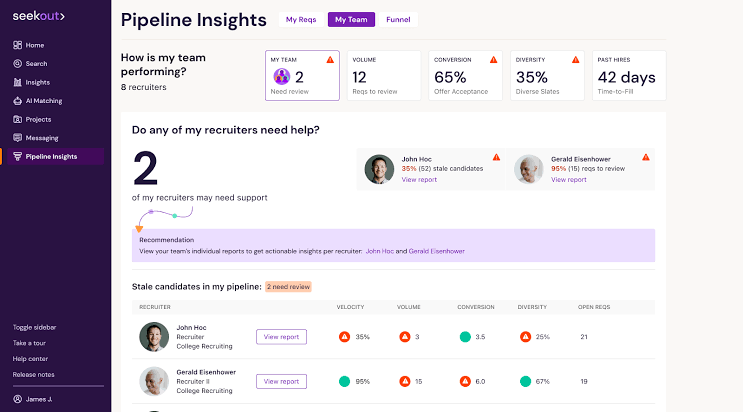
SeekOut pulls together information from various sources like public profiles, academic research, patents, and niche websites to create detailed candidate snapshots.
If you’re hiring engineers or technical roles, you’ll appreciate being able to search specifically for coding languages, frameworks, and actual technical contributions candidates have made.
And unlike databases with stale information, SeekOut continuously refreshes candidate profiles, so you’re always working with current information instead of outdated credentials.
SeekOut best features
- Filter candidates using advanced Boolean search operators combined with natural language processing for more accurate results
- Analyze relevant talent pools through diversity insights that help create more representative candidate slates
- Export comprehensive candidate profiles, complete with verified accomplishments and contact information
- Drop in your job description and let SeekOut surface the most relevant candidates based on skills, background, and recruitment goals
SeekOut limitations
- It imposes a cap on the number of contact credits users can utilize, and these credits do not roll over to subsequent periods
- Users have reported that the phone numbers and emails provided are often incorrect
SeekOut pricing
- Custom pricing
SeekOut ratings and reviews
- G2: 4.5/5 (755+ reviews)
- Capterra: 4.7/5 (185+ reviews)
What are real-life users saying about SeekOut?
A user review says:
🧠 Fun Fact: In 1901, the National Cash Register Company formed the first dedicated HR team after a major strike. Their job? Handle employee grievances, improve morale, and keep the peace. Basically, the original ‘people ops.’
9. JobAdder (Best for recruitment workflow efficiency)
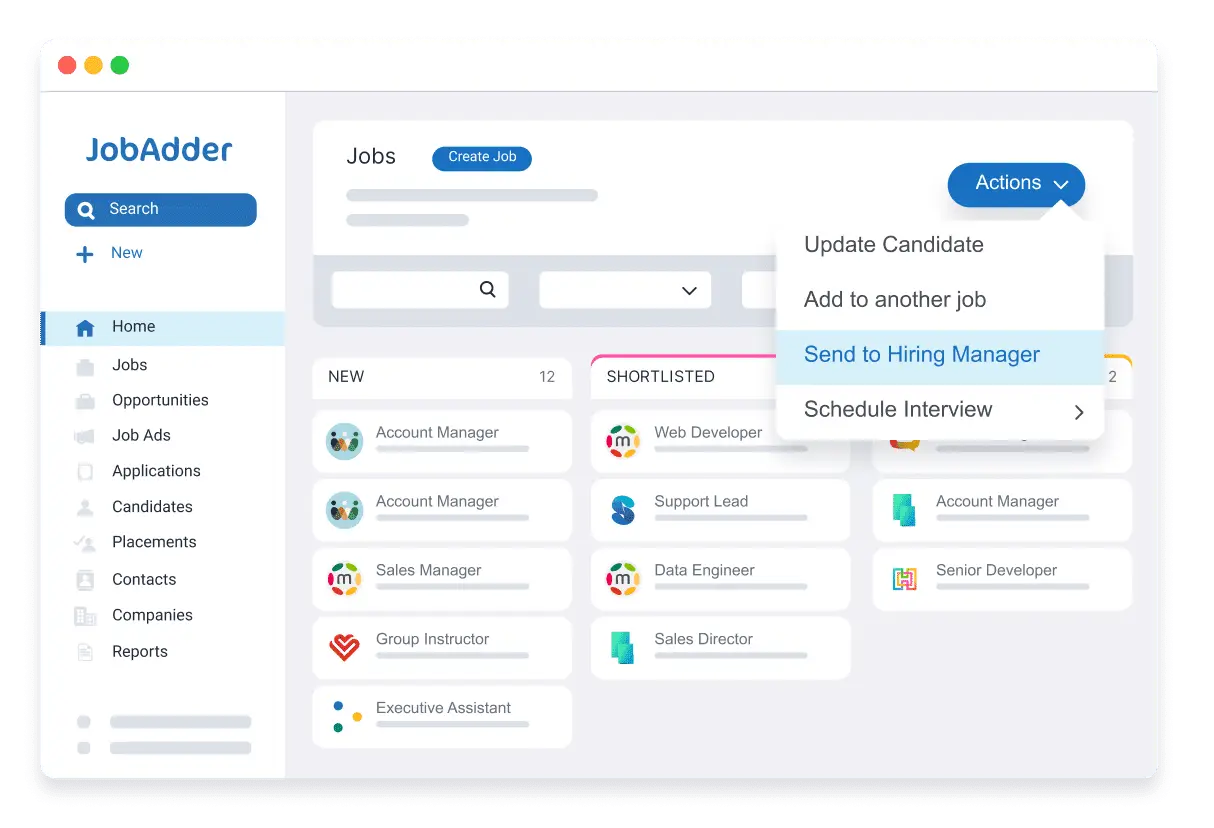
JobAdder makes your recruitment process smoother with a thoughtfully designed interface that follows recruiters’ daily workflow. You’ll notice right away that it eliminates unnecessary clicks and screens that waste your time.
The platform saves you hours with practical features like handling multiple candidates at once, accessing ready-to-use onboarding templates, and setting up automated follow-ups that keep things moving without your constant attention.
JobAdder is comprehensive enough to handle complex recruiting workflows but intuitive enough that new team members can pick it up quickly.
JobAdder best features
- Move candidates through hiring stages with one-click actions that trigger appropriate notifications and next steps
- Access comprehensive mobile functionality that maintains feature parity with the desktop experience
- Integrate with over 200 third-party tools, including job boards, assessment providers, and onboarding systems
- Develop performance management and efficiency reports that identify bottlenecks and celebrate team achievements
JobAdder limitations
- Customization options are less extensive than some enterprise-level competitors with careers page builders
- The platform’s integrations, especially with LinkedIn and Google Workspace, have been reported as unreliable or outdated
- Email templates lack some advanced formatting options
JobAdder pricing
- Custom pricing
JobAdder ratings and reviews
- G2: 4.4/5 (140+ reviews)
- Capterra: 4.5/5 (155+ reviews)
What are real-life users saying about JobAdder?
A user review says:
📖 Also Read: Free Staffing Plan Templates for Recruiters
10. Gem (Best for talent relationship nurturing)
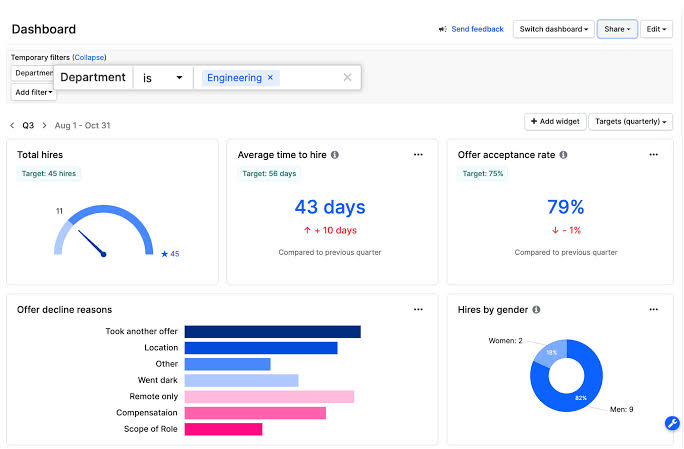
Gem focuses on the often-overlooked aspect of recruitment: maintaining relationships with passive candidates over extended periods. It excels at creating personalized recruitment campaigns that keep talent engaged until the right opportunity emerges.
Recruitment marketing analytics provide clear visibility into which messages and approaches generate the highest engagement rates. The platform builds a unified candidate database that preserves all interactions over time, creating institutional memory even through recruiter turnover.
Gem best features
- Capture candidates directly from LinkedIn and other platforms with a browser extension that preserves all relevant data
- Coordinate team activities with visibility into all candidate touchpoints, preventing duplicate outreach or dropped communications
- Access pipeline analytics that show conversion rates at each recruitment stage across different demographics
Gem limitations
- It’s primarily focused on sourcing and nurturing, and doesn’t offer ATS templates
- Some users find Gem’s interface to be outdated or cluttered
- Requires integration with an ATS for complete recruitment cycle management
Gem pricing
- Startups: $300/month
- Growth: Custom pricing
- Enterprise: Custom pricing
Gem ratings and reviews
- G2: 4.8/5 (220+ reviews)
- Capterra: 4.2/5 (120+ reviews)
What are real-life users saying about Gem?
Here’s a G2 reviewer’s take on this recruitment database software:
💡 Pro Tip: Track reasons why candidates accept or reject offers. Beyond compensation and title, are they joining smaller companies for autonomy? Are they choosing hybrid roles or remote roles, for instance? Capture these details as searchable insights in your recruitment database software—it helps refine employee value proposition (EVP) messaging and role scoping.
Own Your Hiring Flow With ClickUp
Every recruitment database software on this list solves a specific piece of the hiring puzzle.
Some focus on outreach, others shine at compliance or pipeline analytics. But if your goal is to manage the entire hiring journey, without switching tools or losing context, ClickUp stands out.
ClickUp combines candidate tracking, role-based workflows, recruiter collaboration, and real-time dashboards in a single, customizable workspace.
It keeps your process sharp and scalable, from tagging candidates to automating follow-ups. You can build workflows tailored to each role, link feedback directly inside tasks, and use filtered views to focus only on what matters now.
Frequently Asked Questions
What databases do recruiters use?
Recruiters commonly use databases such as Applicant Tracking Systems (ATS), job boards (like LinkedIn, Indeed, Monster), and internal talent pools to store and manage candidate information. Some also use specialized recruitment databases or CRM (Customer Relationship Management) tools tailored for talent acquisition.
What is the best software for recruitment?
The best recruitment software depends on your organization’s needs, but popular options include Greenhouse, Lever, Workable, iCIMS, and BambooHR. These platforms offer features like applicant tracking, interview scheduling, and candidate communication to streamline the hiring process.
Is ATS a database?
Yes, an Applicant Tracking System (ATS) also functions as a recruitment database. It stores candidate resumes, application details, communication history, and other relevant information, making it easier for recruiters to search, filter, and manage applicants.
What is an ATS vs. CRM?
An ATS (Applicant Tracking System) is designed to manage job applications and streamline the hiring process, focusing on tracking candidates through various recruitment stages. A CRM (Customer Relationship Management) in recruitment, often called a Recruitment CRM, is used to build and nurture relationships with potential candidates, even if they are not actively applying for jobs. While ATS is process-driven, CRM is relationship-driven.



